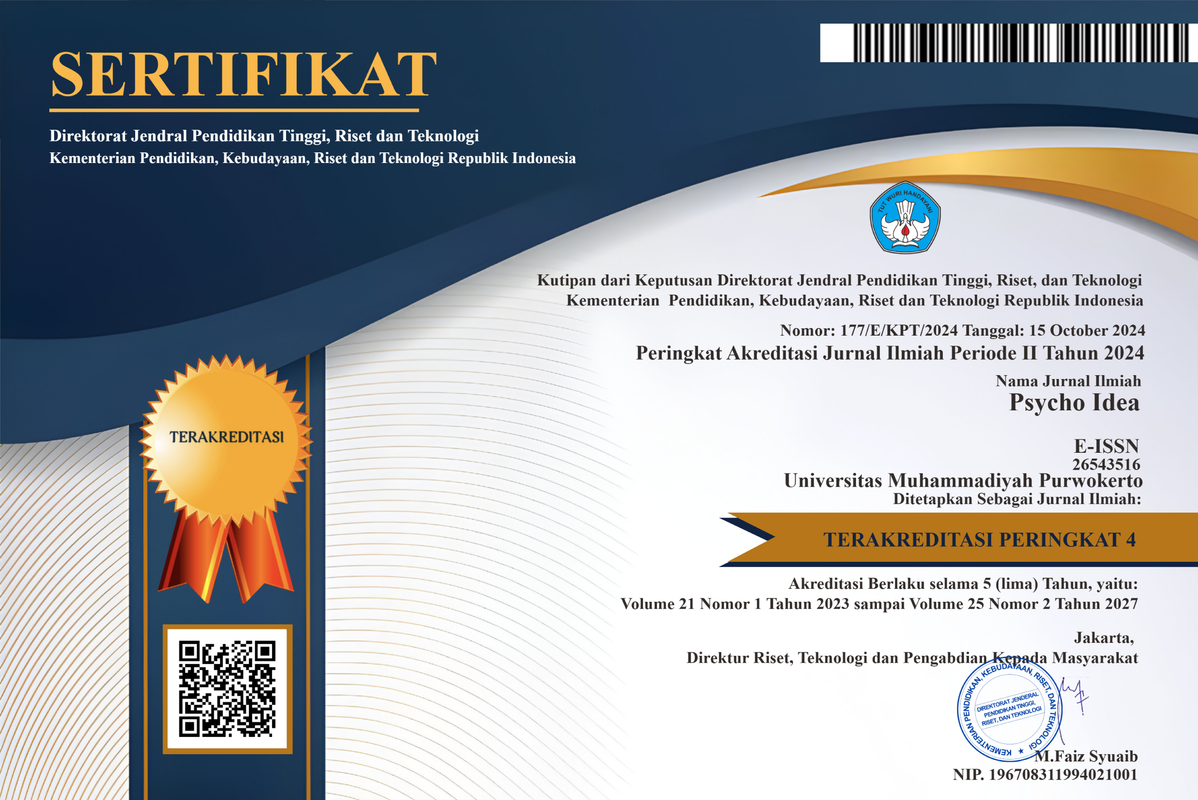HUBUNGAN ANTARA REGULASI EMOSI DENGAN SIKAP ANGGOTA POLISI SEKTOR POLRES PURBALINGGA TERHADAP EFEKTIFITAS KERJA
DOI:
https://doi.org/10.30595/psychoidea.v9i2.247Abstract
Penelitian ini bertujuan untuk menguji hubungan antara regulasi emosi dengan sikap anggota polisi sektor Polres Purbalingga terhadap efektifitas kerja. Penelitian ini menggunakan metode kuantitatif dengan populasi penelitian adalah anggota polisi sektor yang berdinas di masing-masing polsek diseluruh jajaran Polres Purbalingga. Teknik analisis data dengan menggunakan teknik korelasi product moment pearson. Hasil analisis data diperoleh = 0,629 dan 1% = 0,296 ( > ). Hasil penelitian menunjukkan bahwa ada korelasi yang sangat signifikan antara regulasi emosi dengan sikap terhadap efektifitas kerja, dimana semakin tinggi regulasi emosi maka akan semakin baik pula sikap terhadap efektifitas kerjanya dan sebaliknya semakin rendah regulasi emosi maka akan semakin buruk pula sikap terhadap efektifitas kerja. Kata Kunci : regulasi emosi, sikap, efektifitas kerjaReferences
Fattah, N. (2000). Landasan Manajemen Pendidikan. Bandung: Remaja Rosdakarya
Frijda, N.H. (1990). The Emotion. Paris, Cambridge: Cambridge University Press
Garnefski, N., V. Kraaj, & P. Spinhoven,.(2001). Personality and Differences 30. Netherland: Pergamon
Gross, J.J. (1999). Emotion and Emotion Regulation. Dalam L.A. Pervin & O.P. John (Ed.), Theory And Research (2nd edition). New York: Guilford
Patton, P., (2002). EQ: Pengembangan Sukses Lebih Bermakna.Jakarta: Mitra Media
Prawitasari, J. E, dkk. (2003). Psikoterapi: Pendekatan Konvensional dan Kontemporer. Yogyakarta: Pustaka Pelajar dan Unit Publikasi Fakultas Psikologi UGM
Steers, R. M. (1990). Efektivitas Organisasi. Jakarta : Erlangga
Tika, M. P. (2006). Budaya organisasi dan Peningkatan Kinerja Perusahaan. Jakarta. Bumi Aksara .
Downloads
Issue
Section
License
Authors published in this journal agree to the following terms:
- The copyright of each article is retained by the author (s) without restrictions
- The journal allows the author(s) to retain publishing rights without restrictions
- The author grants the journal the first publication rights with the work simultaneously licensed under the Creative Commons Attribution License, allowing others to share the work with an acknowledgment of authorship and the initial publication in this journal.
- Authors may enter into separate additional contractual agreements for the non-exclusive distribution of published journal versions of the work (for example, posting them to institutional repositories or publishing them in a book), with acknowledgment of their initial publication in this journal
- Authors are permitted and encouraged to post their work online (For example in the Institutional Repository or on their website) before and during the submission process, as this can lead to productive exchanges, as well as earlier and larger citations of published work
- Articles and all related material published are distributed under a Creative Commons Attribution-4.0 International Public License (CC - BY 4.0).
License
Psycho Idea is licensed under a Creative Commons Attribution- 4.0 International Public License (CC - BY 4.0).
You are free to :
Share — copy and redistribute the material in any medium or format
Adapt — remix, transform, and build upon the material for any purpose, even commercially











